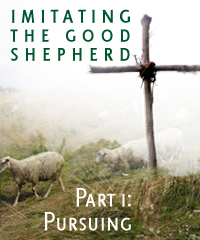Have you been asked to join your fellowship’s leadership team for next year? These articles can help you decide how you’ll respond to the invitation to lead.
Imitating the Good Shepherd, Part 1: Pursuing

What does it mean to pursue the sheep God has given us? “I am the gate’” says Jesus. He is our gate, our point of entry to a new life with God. In a way, the leaders in your fellowship are gates, too — gates through whom the shepherdless sheep on campus can find the warmth of Christian fellowship and, hopefully, the Good Shepherd himself.
Many students, in fact, desire the love, acceptance and truth that your fellowship has to offer. In John 10:9-10 Jesus continues his sheep story, but with a new twist. In this section, Jesus the Good Shepherd says, “I am the gate [for the sheep]; whoever enters through me will be saved.” The scene has changed from the outskirts of a Palestinian village, where the sheep pens had gates, to the countryside, where they often didn’t. Shepherds in rural areas would lie across the entrance at night as human gate to keep sheep in and predators out. Like sheep, our fellow students often fear walking into an unknown situation. They need to feel safe.
Jesus goes on to describe the life of a sheep in his flock: “He will come in and go out, and find pasture. The thief comes only to steal and kill and destroy; I have come that [the sheep] may have life, and have it to the full.” To a Jew, to “come in and go out” as you please implied that you enjoyed security, abundance and peace. This phrase takes on particular significance when discussing sheep; they easily get sick when threatened by predators or a lack of nourishment. People also need God’s peace and provision to thrive. Think of those around you whose lives are characterized by chaos, fear, anger or insecurity. They need a shepherd to lead them into pasture.
Good shepherds pursue people who are scared to get involved. They are “gates” — initiating relationships and acting like hosts (rather than guests or members) at large- and small-group meetings.
One day my brothers and I were once again trying to move the sheep into the barn (see the Introduction for my first adventure). Everything was going smoothly until the last little lamb reached the door and froze in fear; the rest of the sheep had disappeared into the rear of the barn, and all he could see was darkness.
He took one last look at the door, turned on his heels and shot through my hands. He zipped across the corral, squeezing under the gate faster than I could leap over it. Over ditches and under barbed-wire fences into the open pasture he flew, with me huffing and puffing behind him. After many aborted grabs, I finally snagged the little bugger a good half mile from the barn. I held him tight and spoke softly to him. I could feel his heart beating thum-thum-thum-thum against my chest. His eyes were rolled back. Each pant jerked into the next as he tried to catch his breath. (I wasn’t doing much better.)
That’s how hard you may need to pursue new students — especially if they’ve never visited a Christian group before. They may feel nervous, alone and out of place. So call them. Drop by. Chase them out through the pastures of your campus. Draw them to yourself and bring them in through the gate where they can come in and go out in peace.
For many years, I served on InterVarsity staff at Colorado State U. As we’d gather for the weekly large-group meetings, I’d try to meet all the students I don’t recognize. Once I’d gotten to know them a little, I would introduce them to someone else in the fellowship — perhaps someone with whom they shared something obvious in common (year in school, major, whatever). I’d then slip away to meet other new people. During the meetings I would next to someone I didn’t know and introduce him or her around afterwards.
Though our initial interaction with people is critical, we don’t stop being “gates” for people after the first meeting — or even the fourth. We small-group leaders and other leaders must continue to pursue new folks until they are secure enough in their relationships with us and God to be gates for someone else. One student whom we initially welcomed into our InterVarsity chapter tearfully told me how she had tried all year to find her niche among us, but always felt excluded. Here’s a lamb who was invited to go through the gate, but always felt us slamming it back in her face when she tried to do so. What could we have done differently to help her feel welcome and then to welcome others?
—Dennis Anderson
You are reading part 1 of a series on imitating the Good Shepherd. Click on a link below to explore more:
Imitating the Good Shepherd: Introduction
Imitating the Good Shepherd, Part 1: Pursuing (You are here.)






